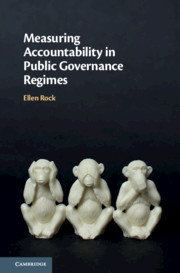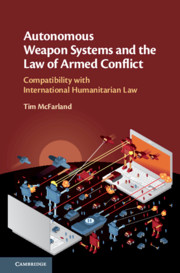Refine search
Actions for selected content:
12 results
Bridging the accountability gap of artificial intelligence – what can be learned from Roman law?
-
- Journal:
- Legal Studies / Volume 44 / Issue 1 / March 2024
- Published online by Cambridge University Press:
- 18 January 2023, pp. 65-80
- Print publication:
- March 2024
-
- Article
-
- You have access
- Open access
- HTML
- Export citation
5 - The New Economic Governance of the Eurozone and the (Im)Possibilities of External Review
- from Part II - The New Economic Governance of the Eurozone: A Rule of Law Analysis
-
- Book:
- The New Economic Governance of the Eurozone
- Published online:
- 14 July 2022
- Print publication:
- 28 July 2022, pp 212-278
-
- Chapter
- Export citation
2 - AWS
-
- Book:
- The Legality and Accountability of Autonomous Weapon Systems
- Published online:
- 05 May 2022
- Print publication:
- 19 May 2022, pp 45-102
-
- Chapter
- Export citation
Part I - Accountability Deficits and Overloads
-
- Book:
- Measuring Accountability in Public Governance Regimes
- Published online:
- 28 September 2020
- Print publication:
- 01 October 2020, pp 11-36
-
- Chapter
- Export citation
Introduction
-
- Book:
- Measuring Accountability in Public Governance Regimes
- Published online:
- 28 September 2020
- Print publication:
- 01 October 2020, pp 1-10
-
- Chapter
- Export citation
2 - Too Little or Too Much of a Good Thing?
- from Part I - Accountability Deficits and Overloads
-
- Book:
- Measuring Accountability in Public Governance Regimes
- Published online:
- 28 September 2020
- Print publication:
- 01 October 2020, pp 25-36
-
- Chapter
- Export citation
Part II - Benchmark of Accountability
-
- Book:
- Measuring Accountability in Public Governance Regimes
- Published online:
- 28 September 2020
- Print publication:
- 01 October 2020, pp 37-212
-
- Chapter
- Export citation
1 - Defining Accountability
- from Part I - Accountability Deficits and Overloads
-
- Book:
- Measuring Accountability in Public Governance Regimes
- Published online:
- 28 September 2020
- Print publication:
- 01 October 2020, pp 13-24
-
- Chapter
- Export citation
Conclusion
-
- Book:
- Measuring Accountability in Public Governance Regimes
- Published online:
- 28 September 2020
- Print publication:
- 01 October 2020, pp 273-277
-
- Chapter
- Export citation

Measuring Accountability in Public Governance Regimes
-
- Published online:
- 28 September 2020
- Print publication:
- 01 October 2020
7 - Accountability
-
- Book:
- Autonomous Weapon Systems and the Law of Armed Conflict
- Published online:
- 17 June 2020
- Print publication:
- 09 July 2020, pp 127-174
-
- Chapter
- Export citation

Autonomous Weapon Systems and the Law of Armed Conflict
- Compatibility with International Humanitarian Law
-
- Published online:
- 17 June 2020
- Print publication:
- 09 July 2020
